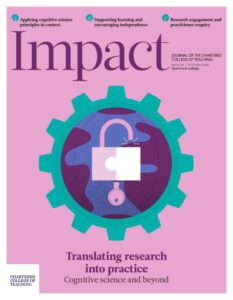What does it look like in the classroom? The ever-evolving understanding of the features of formative assessment
Written by: Shirley Clarke

9 min read
Shirley Clarke
Formative assessment, as a concept, became known as a result of the seminal review by Black and Wiliam published in 1998. This was commissioned by the Assessment Reform Group as a reaction to the entire focus in England at the time on summative assessment. The principles were welcomed by all, but the missing piece was how those principles would look in practice. Having already been working on some of the elements, I decided to create my first ‘learning teams’ – teachers experimenting within their own classrooms – and I continue to run a number of these every year. They have proved to be effective for creating formative assessment ‘experts’, with the knowledge to be able to lead development back in their schools, but the teachers’ feedback has also enabled the practical strategies to develop and evolve, as we learn more about student learning and the impact of strategic teaching. This article first outlines the methodology used for the learning teams, then
Join us or sign in now to view the rest of this page
You're viewing this site as a guest, which only allows you to view a limited amount of content.
To view this page and get access to all our resources, join the Chartered College of Teaching (it's free for trainee teachers and half price for ECTs) or log in if you're already a member.
- Black P and Wiliam D (1998) Assessment and classroom learning. Assessment in Education: Principles, Policy and Practice 5(1): 7–73.
- Clarke S (2014) Outstanding Formative Assessment. London: Hachette.
- Clarke S (2021) A Little Guide for Teachers: Formative Assessment. Corwin, California: Sage Publications
- Claxton G (2002) Building Learning Power. Bristol: TLO Limited.
- Darling-Hammond L, Hyler ME and Gardner M (2017) Effective Teacher Professional Development. Palo Alto, CA: Learning Policy Institute.
- Rowe MB (1974) Relation of wait-time and rewards to the development of language, logic and fate control. Journal of Research in Science Teaching 11(4): 292.
- Sadler R (1989) Formative assessment and the design of instructional systems. Instructional Science 18: 119–144.
0
0
votes
Please Rate this content
Please login to comment
0 Comments
Oldest
Newest
Most Voted
Inline Feedbacks
View all comments










